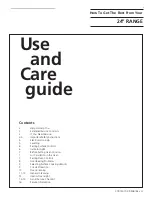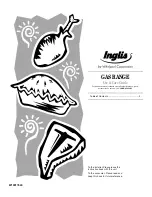
6
Causes of damage
Hob
Caution!
■
Ensure that the top cover is not closed when the oven is
started up.
■
Only use the burners when cookware has been placed on
top. Do not heat up empty pots or pans. The saucepan base
will be damaged.
■
Clear up spills immediately. Use deep pots for dishes with a
lot of liquid. This will prevent the food from boiling over.
■
Ensure that the hotplate/burner is never switched on when
the hob cover is on, e.g. by children playing.
■
Keep the hotplate dry. Salt water or wet saucepan bases will
damage the hotplate.
■
Never operate the hotplate without a pot on it. Never use pots
with an uneven base. Not enough heat will be drawn from the
hotplate. It may glow red.
Damage to the oven
Caution!
■
Accessories, foil, greaseproof paper or ovenware on the
cooking compartment floor: do not place accessories on the
cooking compartment floor. Do not cover the cooking
compartment floor with any sort of foil or greaseproof paper.
Do not place ovenware on the cooking compartment floor if a
temperature of over 50 ºC has been set. This will cause heat
to accumulate. The baking and roasting times will no longer
be correct and the enamel will be damaged.
■
Water in a hot cooking compartment: do not pour water into
the cooking compartment when it is hot. This will cause
steam. The temperature change can cause damage to the
enamel.
■
Moist food: do not store moist food in the cooking
compartment when it is closed for prolonged periods This will
damage the enamel.
■
Fruit juice: when baking particularly juicy fruit pies, do not
pack the baking tray too generously. Fruit juice dripping from
the baking tray leaves stains that cannot be removed. If
possible, use the deeper universal pan.
■
Cooling with the appliance door open: only allow the cooking
compartment to cool when it is closed. Even if the appliance
door is only open a little, front panels of adjacent units could
be damaged over time.
■
Very dirty door seal: If the door seal is very dirty, the
appliance door will no longer close properly when the
appliance is in use. The fronts of adjacent units could be
damaged.Always keep the door seal clean.
■
Appliance door as a seat, shelf or worktop: Do not sit on the
appliance door, or place or hang anything on it. Do not place
any cookware or accessories on the appliance door.
■
Inserting accessories: depending on the appliance model,
accessories can scratch the door panel when closing the
appliance door. Always insert the accessories into the
cooking compartment as far as they will go.
■
Carrying the appliance: do not carry or hold the appliance by
the door handle. The door handle cannot support the weight
of the appliance and could break.
Damage to the plinth drawer
Caution!
Do not place hot objects in the plinth drawer. It could be
damaged.
Installation and connection
Electrical connection
The appliance must be connected to the mains by a licensed
expert. The regulations of your electricity supplier must be
observed.
Any damage arising from the appliance being connected
incorrectly will invalidate the guarantee.
Caution!
If the supply cord is damaged, it must be replaced by the
manufacturer, its service agent or similarly qualified persons in
order to avoid a hazard.
For the installer
■
An all-pole isolating switch with a contact gap of at least
3 mm must be present in the installation circuit. This is not
necessary if the appliance is connected by a plug that is
accessible to the user.
■
Electrical safety: The cooker corresponds to safety class I
and may only be used in conjunction with a safety earth
terminal.
■
A type H 05 VV-F or equally rated lead must be used to
connect the appliance.
Levelling the cooker
Always place the cooker directly on the floor.
1.
Pull out the plinth drawer and lift it up and out.
There are adjustable feet at the front and rear on the inside of
the plinth.
2.
Use an Allen key to raise or lower the adjustable feet as
necessary until the cooker is level (picture A).
3.
Push the plinth drawer back in (picture B).
Wall fixing
To prevent the cooker from tipping over, you must fix it to the
wall using the enclosed bracket. Please observe the installation
instructions for fixing the oven to the wall.
%
$
Summary of Contents for HSA420123
Page 2: ...2 Ø cm ...







































